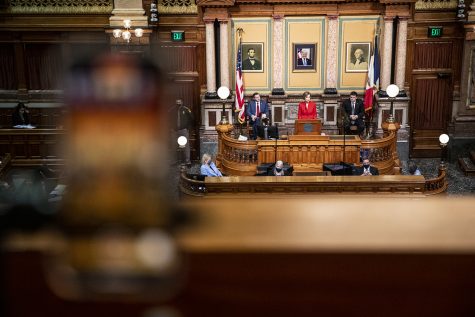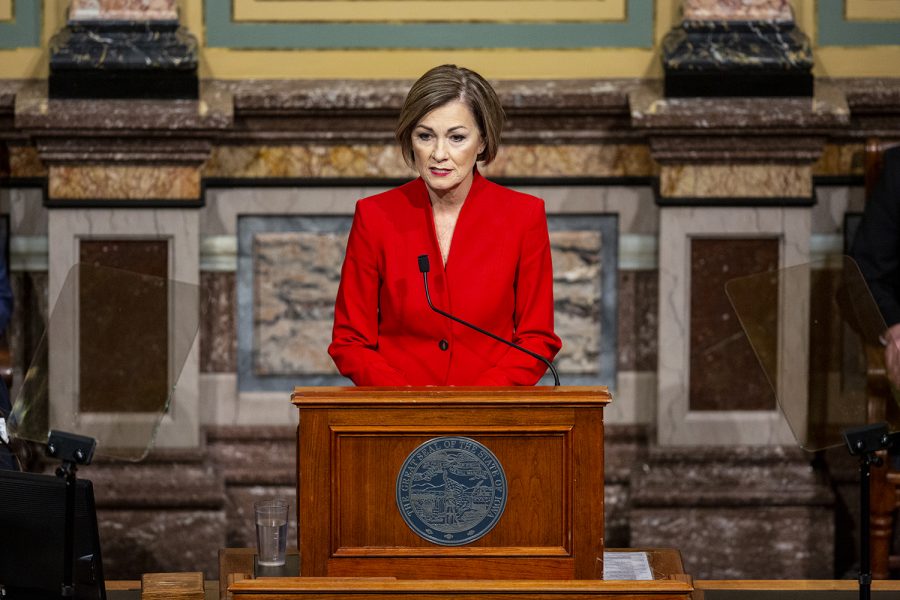Governor calls for in-person learning and tax cuts in Condition of the State address
Gov. Kim Reynolds outlined her legislative priorities in an address on Tuesday, calling for tax cuts, in-person learning, and investments in high speed internet as the state attempts to emerge from the coronavirus pandemic.
Gov. Kim Reynolds delivers the condition of the state address to a joint session of the Iowa House and Senate.
January 12, 2021
DES MOINES — Iowa Gov. Kim Reynolds laid out her legislative priorities in her annual Condition of the State address on Tuesday, touting economic policy and in-person learning as a means to bounce back from an unprecedented year.
She promised funding for rural high-speed internet, child care, and changes to policing and K-12 education as the state attempts to emerge from the coronavirus pandemic. The pandemic has taken the lives of more than 4,000 Iowans and the state continues to report an average of more than 1,000 cases a day.
The speech, which was at 6 p.m., breaking from the traditional morning time, was addressed directly to Iowans and touched on some of the tragedies of the previous year, such as the pandemic and the derecho that hit several communities in August.
“There’s a lot to do this year, but if we tackle issues like broadband, child care, workforce training, and affordable housing, we’ll set Iowa on a solid path for economic prosperity for years to come,” Reynolds said Tuesday.
Many Democrats did not attend the address in person, but chose to watch it remotely as a precautionary measure because of COVID-19. A spokesperson for the House Democrats noted the absence was not a boycott of the address.
Democratic leadership in the state House and Senate said in a press conference following the speech that Reynolds’ address was campaign rhetoric.
“We are still in this pandemic, and the speech tonight did not reflect a governor who was in touch with that fact,” said state Rep. Jennifer Konfrst, D-Windsor Heights, the House Democratic Whip.
In-person learning
In her address, Reynolds joined the call from Iowa Republicans yesterday to offer an option for students to take classes fully in person, which would require some schools that use a hybrid structure to offer a 100 percent in-person option.
She shared stories of students who had fallen behind or teachers who had high absenteeism during online classes, and said she spoke with both parents and teachers who wanted kids back in the classroom.
She called for the Legislature to send a bill to her desk Tuesday night that would give parents the choice to send their kids back to school full time.
Reynolds also proposed expanding open enrollment, which would allow families to enroll their child in schools of their choice, even if that school is not in their community. She said she would push to prohibit schools from limiting open enrollment, which she said would increase students’ and parents’ choice over their education.
“If there’s one thing the pandemic has taught us about education, it’s that our parents need choice,” Reynolds said. “And it’s not just in-person versus virtual. Sometimes it’s about which school to attend altogether.”
State House Minority Leader Todd Prichard said in a press conference that allowing children to be in school full time is a dangerous move.
“This one size fits all approach simply isn’t safe,” Prichard said. “Instead of dictating by fiat — ‘this is how you’re gonna do it,’ let’s support them, let’s be a partner.”
State Senate Minority Leader Zach Wahls said in the press conference that the reason why Iowa is having a hard time facilitating remote learning is due to “decades of underfunding public school programs.”

Child care
One of the main goals of the Legislature last year was to eliminate the child care “cliff.” Under current law, parents lose state assistance for child care once their income reaches a certain point. Republicans have called again to eliminate that cliff, making sure state assistance tapers off as income goes up, and Reynolds’ proposed budget includes more state money to child-care initiatives.
“In Pottawattamie County, a group of daycare providers and other partners teamed up to provide free daycare for essential workers,” Reynolds said. “But many parents weren’t so lucky and struggled to find ways to care for their children and still show up for work—often in roles that are essential to all of us.”
Reynolds’ proposal would increase the eligibility for families to receive tax credits for child care, use block grants to encourage the formation of child-care centers in places where services are lacking, and provide wage assistance for child-care workers.
Reynolds praised public-private partnerships as a solution for child care issues. In her budget proposal, Reynolds wants to allocate $3 million to jump start those partnerships.
“Let’s remove the obstacles to high-quality, affordable child care so that Iowa families can nurture their kids while parents maintain the maximum freedom to enter and remain in the workforce,” she said.
Tax cuts
Reynolds called for the elimination of income tax triggers that were put in place to pass tax cuts in 2018. Currently, the state would have to meet a certain revenue target to trigger tax cuts, but Reynolds is calling to go forward with the cuts, which would see consolidation of tax brackets and a reduction in the highest tax bracket by 2023.
“We aren’t looking at tough budget cuts and we’re certainly not looking at raising taxes,” Reynolds said. “If anything, we need to continue the conversation about cutting taxes, and we can start by getting rid of the unnecessary triggers that were put in place in 2018.”
Yesterday, Republican leaders said lowering taxes was a major goal of the session. However, House Speaker Pat Grassley said in a press conference after the address that the triggers were an important piece of the 2018 tax bill and have been working well. He didn’t indicate whether House Republicans would support eliminating them.
“Any conversation leading up to the session about tax policy, whether it’s a further reduction in individual income tax for everyday Iowans, whether it’s a part of the triggers, we want to be a part of those conversations and we want to continue to look for opportunities,” he said.
Wahls said Reynolds’ tax plan will largely benefit wealthier Iowans.
“Tonight the governor proposed $15 million for mental health and 1.6 billion in tax cuts … I think that outlines her priorities pretty well,” Wahls said.
Rural broadband
Reynolds said she would push to commit $450 million over five years to rural broadband initiatives, which she said would bring more money in private investment for the required infrastructure to bring high-speed internet to rural areas in Iowa.
Reynods said a third of Iowa counties are broadband deserts, and the investment would bring high-speed internet to every part of Iowa.
Senate Majority Leader Jack Whitver, R-Ankeny, said in a press conference after the address that the investment in rural broadband would help grow economic opportunities in rural areas.
“There are a lot of people in our caucus that are excited for investments in broadband because we know some of the shortcomings now,” Whitver said. “When our schools shut down, there were a lot of people that didn’t have the access they needed.”
Police protection and reform
Reynolds said she wanted to further criminal justice work, building on a police reform bill she signed this summer.
She said she would push for a bill that increases punishment for assaulting a police officer, while simultaneously banning racial profiling in police departments.
“The bill will make clear that if you riot or attack our men and women in uniform, you will be punished,” she said. “We won’t stand for it.”



